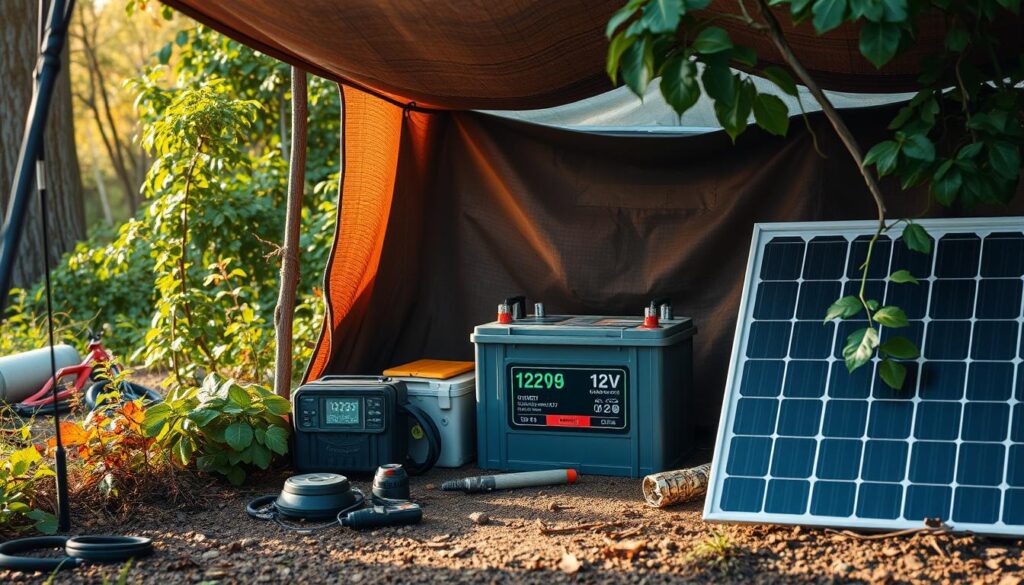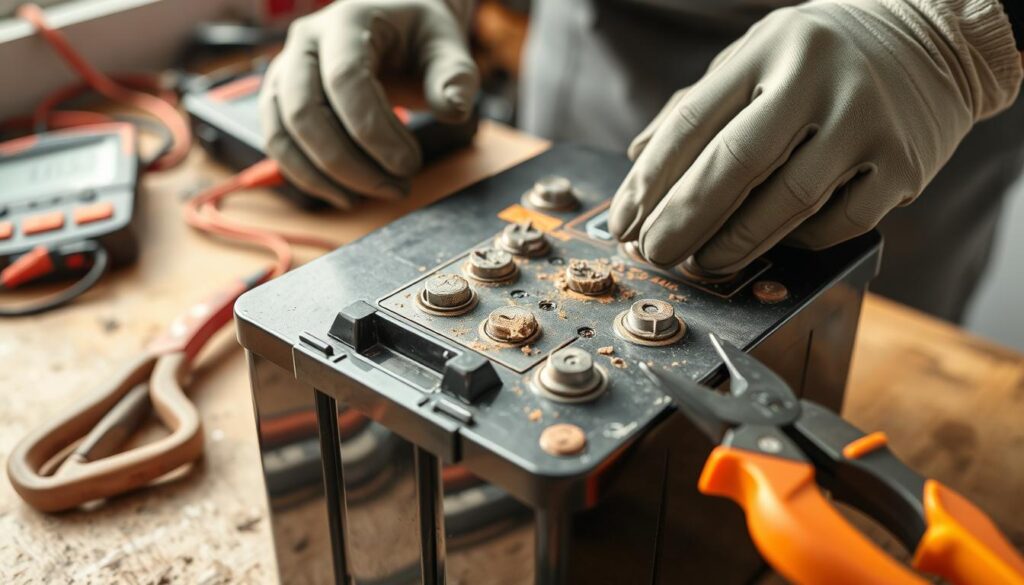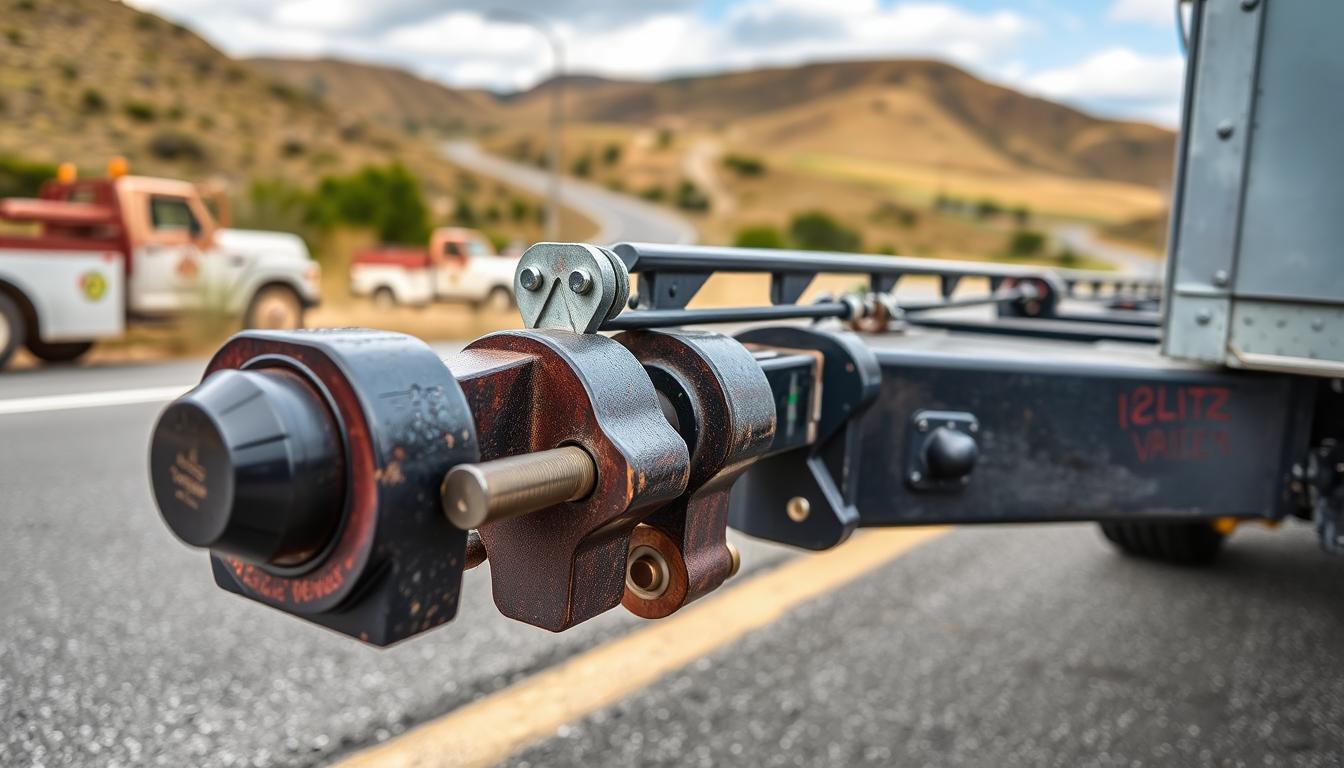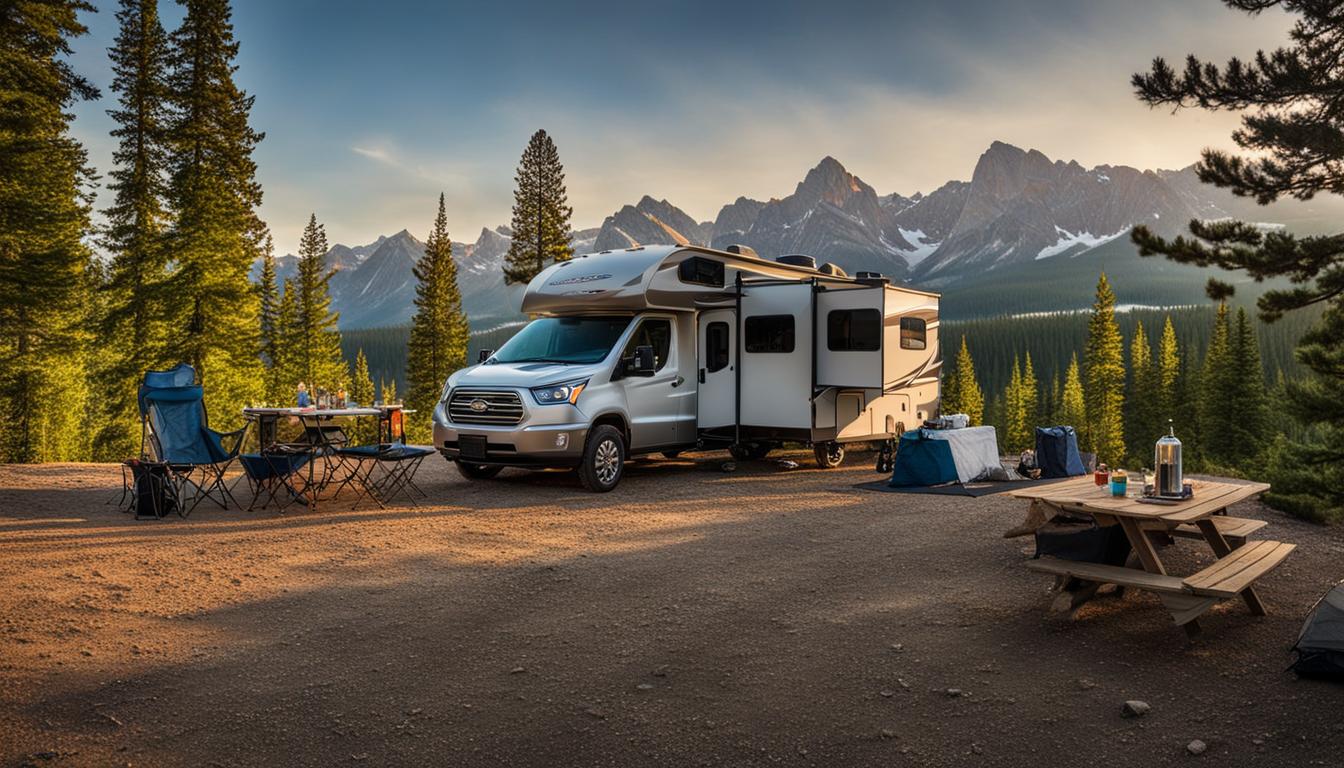Keeping your 12v camper battery in top shape is key for reliable power on RV trips. RVs need deep-cycle batteries that can handle constant use. There are three main types: flooded lead-acid, sealed lead-acid, and lithium-ion batteries.
This guide will help you maintain your 12v camper battery for a longer life. By understanding your battery system and following best practices, you can extend your battery’s life. This way, you’ll avoid unexpected power issues on your travels.
Key Takeaways
- Understand the different types of deep-cycle 12v camper batteries.
- Regular maintenance can significantly extend battery life.
- Proper charging techniques are key for longevity.
- Keep your battery above 50% charge to avoid sulfation.
- Clean battery terminals to prevent corrosion buildup.
- Monitor battery health regularly for optimal performance.
Understanding Your 12v Camper Battery System
Knowing how your camper’s battery system works is key for reliable power on the road. The right deep-cycle battery meets your RV’s electrical needs.
Types of 12v Batteries for Campers
There are three main types of 12v batteries for campers:
- Flooded Lead-Acid: These need regular checks, like water levels.
- Sealed Lead-Acid: They come as gel or AGM, needing no upkeep and less spill risk.
- Lithium-Ion Batteries: They’re efficient, long-lasting, and the easiest to maintain.
Basic Battery Components
A deep-cycle battery has many cells. Each cell has electrodes in an electrolyte solution. Together, they store and release energy as needed.
How Camper Batteries Work
Camper batteries power important systems like lights, appliances, and GPS. Deep-cycle batteries give steady power for a long time. This keeps your RV running smoothly.
Essential Tools for Battery Maintenance
Keeping your 12v camper battery in top shape needs the right battery maintenance tools. With these tools, you can keep your battery working well for longer. This means more fun on your trips.
A multimeter is key for checking your battery’s voltage and current. It spots problems early and makes sure your battery charges right. Using a multimeter often stops sudden power losses on your travels.
A hydrometer is great for flooded lead-acid batteries. It shows the battery’s charge level and health by measuring electrolyte specific gravity. Keeping an eye on these levels keeps your battery balanced.
Clean battery terminals are vital to avoid corrosion. A battery terminal cleaner gets rid of dirt and ensures a strong connection. Clean terminals mean better power flow and less chance of electrical problems.
- Multimeter: Measures voltage and current to diagnose battery health.
- Hydrometer: Checks the electrolyte’s specific gravity in flooded batteries.
- Battery Terminal Cleaner: Removes corrosion and ensures clean connections.
Getting these battery maintenance tools makes upkeep easier and boosts your camper’s power system reliability. Regular care with the right tools avoids common battery issues. This keeps your adventures powered up and worry-free.
Regular Inspection and Cleaning Procedures
Keeping your 12v camper battery in good shape is key. Regular checks and cleanings help it work well and last longer.
Visual Inspection Checklist
- Check the battery case for cracks or leaks.
- Inspect connections for tightness and signs of wear.
- Ensure all cables are secure and free from damage.
- Look for any signs of swelling or bulging in the battery.
Cleaning Battery Terminals
Cleaning your battery terminals right is vital. Mix baking soda with clean water, one part to six parts. Then, disconnect the terminals and brush the solution on them.
Scrub off any buildup and rinse with water. Dry them well before reconnecting. This stops problems later on.
Checking for Corrosion
Corrosion can slow down your battery and cause power issues. Look for white or greenish spots on the terminals often. To stop corrosion, use petroleum jelly or anti-corrosion spray after cleaning.
Fix any corrosion quickly. This keeps connections strong and ensures your electrical system runs smoothly.
12v Camper Battery Maintenance Tips for Extended Life
Keeping your 12v camper battery in good shape is key for reliable power on the go. Proper charging, effective storage, and controlling temperature can make your battery last longer and work better.

Proper Charging Techniques
Use a good charger and follow stage-charging to keep your battery healthy. Don’t overcharge by watching the voltage and stopping when it’s full. Keeping the battery at 10.5 volts or higher helps avoid damage from deep discharge.
Storage Best Practices
Keep your battery charged above 50% when storing your camper to prevent sulfation. Store it in a cool, dry spot. Disconnect the battery to slow down self-discharge. Check and top up the charge regularly to be ready for your next adventure.
Temperature Management
Keeping the right temperature is important for your battery’s health. Heat speeds up self-discharge, while cold makes it less efficient. Store batteries in a stable temperature and use insulation or ventilation to protect against extreme temperatures.
Monitoring Battery Health and Performance
Keeping an eye on your battery health monitoring is key for a reliable 12v camper battery. This way, you can avoid power problems on the road.
Voltage testing is a good method. A fully charged battery should have about 1.265 specific gravity. If it’s not charged, the gravity drops to 1.120, or the voltage is 11.7 volts DC. Testing the voltage regularly helps you know when to charge your battery.
For flooded lead-acid batteries, checking the specific gravity of the electrolyte is important. Use a hydrometer to measure each cell’s specific gravity. If the readings are consistent, your battery is healthy. But if they’re low, it might need maintenance or a new battery.
- Keep a detailed maintenance log to track voltage and specific gravity readings over time.
- Watch for signs of battery wear, like reduced capacity or trouble holding a charge.
- Make sure to charge your battery correctly to avoid damage from deep discharges.
Regular battery health checks, including voltage and specific gravity tests, can make your camper battery last longer. This way, you can have power without interruption on your trips.
Common Battery Issues and Troubleshooting
Your camper battery might not work right for many reasons. Spotting battery failure signs early can stop bigger problems on your trips.
Signs of Battery Failure
- Slow cranking when starting your camper.
- Dimming lights showing less power.
- Unusual noises or clicking sounds from the electrical system.
- Corrosion around battery terminals.
- Frequent need to recharge the battery.
Quick Fix Solutions
- Make sure all connections are tight and free from corrosion.
- Clean the battery terminals often to keep good contact.
- Check the electrolyte levels in flooded lead-acid batteries and top up with distilled water if needed.
- Use a battery charger to bring up charge levels if the battery voltage drops below 10.5 volts.
When to Seek Professional Help
If quick fixes don’t work and you’re facing battery issues, it’s time to see a professional battery service. Issues like frequent battery failure signs, not holding a charge, or visible damage need expert help. They can check your camper’s electrical system and replace the battery if needed.

| Battery Failure Sign | Possible Cause | Action |
|---|---|---|
| Slow Cranking | Low charge or aged battery | Recharge the battery or consider replacement |
| Dimming Lights | Weak battery or faulty connections | Check connections and charge or replace battery |
| Corrosion | Build-up on terminals | Clean terminals and apply anti-corrosion spray |
| Frequent Recharging | Battery not holding charge | Test battery health or get professional service |
Seasonal Maintenance Guidelines
Keeping your camper’s battery in top shape all year is key. Adjusting your care routine with the seasons can stop common problems. It also makes your battery last longer.
Winter Storage Preparation
Get your battery ready for winter. Store it in a cool spot, away from concrete floors. Keep it at about 40 degrees Fahrenheit. Make sure it’s charged over 50% to avoid damage.
Disconnect it from your camper. This stops it from draining too much. It also keeps it safe from extreme temperatures.
Summer Care Tips
In the summer, focus on keeping your battery cool. Place it somewhere it can breathe, away from sunlight and heat. Check its charge often and don’t let it drop below 50%.
Good air flow helps keep it cool. This keeps your battery working well.
Spring Revival Process
When spring comes, wake up your battery. First, check for any damage or corrosion. Clean the terminals with baking soda.
Charge it fully to get it back to top shape. Spring checks can spot any winter problems.
| Season | Maintenance Tips |
|---|---|
| Winter | Store in cool place, keep charge above 50%, disconnect from camper |
| Summer | Avoid overheating, ensure ventilation, maintain charge levels |
| Spring | Inspect and clean terminals, perform full charge cycle, check for damage |
Safety Precautions During Maintenance
Keeping your 12v camper battery safe is key for your safety and the battery’s life. It’s important to avoid accidents and damage during maintenance.
Always wear the right protective equipment like goggles and gloves when working with batteries. These protect you from acid spills and electrical dangers, which are important for safe maintenance.
Following the right handling precautions is essential. First, disconnect the battery from your camper to avoid electrical shocks. Make sure you work in a place with good air flow to avoid harmful fumes from the battery.
Don’t use tools that can spark near the battery. Keep things that can catch fire away and watch your area to avoid fires or explosions. Always check your work area to keep it safe while you do maintenance.
| Safety Tip | Description |
|---|---|
| Wear Protective Gear | Use goggles and gloves to protect against acid and electrical hazards. |
| Disconnect Battery | Ensure the battery is disconnected to prevent electrical shocks. |
| Ensure Ventilation | Work in a well-ventilated area to avoid inhaling toxic fumes. |
| Avoid Sparks | Use non-sparking tools and keep flammable materials away. |
Extending Battery Lifespan Through Proper Usage
To make your 12v camper battery last longer, focus on battery load management, charging cycles, and battery usage habits. These steps help keep your battery working well on your trips.
Load Management Tips
- Limit the use of high-power appliances to reduce strain on the battery.
- Turn off devices and lights when not in use to conserve energy.
- Use energy-efficient appliances to minimize battery drain.
Charging Cycles Best Practices
- Charge your battery fully before beginning a trip to ensure maximum capacity.
- Avoid letting the battery discharge below 50% to prevent damage.
- Use a quality charger to maintain proper charging cycles and extend battery life.
Usage Habits That Affect Battery Life
- Regularly monitor battery levels to avoid unexpected shutdowns.
- Store your battery in a cool, dry place to maintain its efficiency.
- Avoid leaving the battery connected for extended periods when not in use.
Conclusion: Maximizing Your Camper Battery’s Potential
Keeping your camper battery in top shape is key for every trip. Good camper battery care means checking it often, charging it right, and handling it safely.
By sticking to a detailed battery maintenance summary, you can make your battery last longer. Keeping it charged above 50% and using a good charger helps avoid deep discharges. This extends its life.
Using tools like multimeters and hydrometers lets you check your battery’s health. Also, storing it in a cool, dry spot and avoiding extreme temperatures boosts its performance.
These battery life optimization tips not only extend your battery’s life but also ensure power when you need it. Regular checks reduce the chance of power problems. This lets you enjoy your RV trips worry-free.
Investing in proper care for your camper battery makes your power system more reliable. Adopt these maintenance habits to get the most from your RV battery. This way, you’ll have dependable energy for years of travel.



